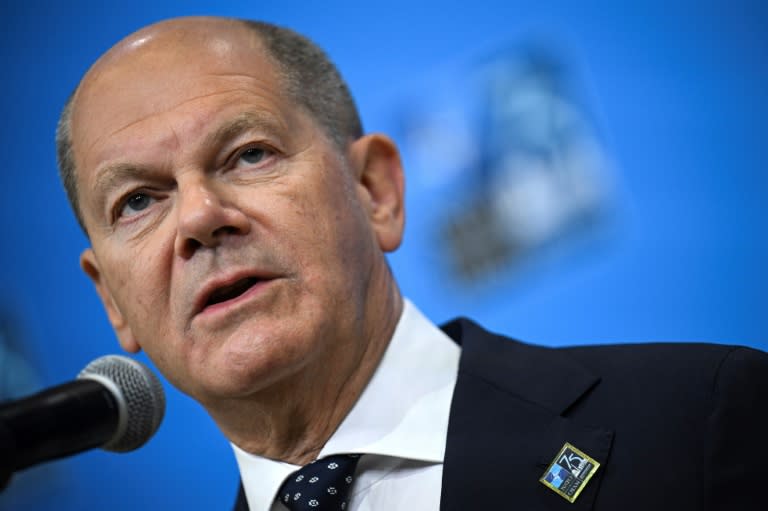Scholz says US long-range missiles in Germany to help 'securing peace'

Chancellor Olaf Scholz on Thursday hailed a decision from the United States to periodically station long-range missiles in Germany as a step to increase deterrence against Russia.
Washington's move marks a return of US cruise missiles to Germany after a 20-year absence, and has sparked criticism even among members of Scholz's Social Democrats.
The Kremlin also said the decision to station US missiles in Germany was pushing Russia and the West towards a Cold War-style confrontation.
Defending the decision, Scholz told reporters at a NATO summit in Washington it is "something of deterrence and it's securing peace, and it is a necessary and important decision at the right time."
The United States on Wednesday said the "episodic deployments" of long-range missiles to Germany will begin in 2026.
The White House said it would eventually look to permanently station them in Germany, and the missiles would "have significantly longer range" than current US systems in Europe.
"Exercising these advanced capabilities will demonstrate the United States' commitment to NATO and its contributions to European integrated deterrence," it said in a joint statement with the German government.
The missile decision signalled "steady steps towards the Cold War", Kremlin spokesman Dmitry Peskov told a state TV reporter.
"All the attributes of the Cold War with the direct confrontation are returning," Peskov said.
- 'Serious gap' -
German Defense Minister Boris Pistorius told broadcaster Deutschlandfunk the deployment decision addressed a "very serious gap" in the country's capabilities.
The German army does not have long-range missiles that launch from the ground, only cruise missiles that can be fired by aircraft.
But the announcement sparked an outcry in Germany, where the deployment of US missiles brings back painful memories of the Cold War.
Ralf Stegner, an MP for Scholz's Social Democrats, said the missile decision could signal the start of a new "arms race."
"This will not make the world safer. On the contrary, we are entering a spiral in which the world is becoming increasingly dangerous," warned Stegner.
Sahra Wagenknecht, a prominent far-left figure in Germany, told the Spiegel weekly that US missile deployment "increases the danger that Germany itself will become a theatre of war."
The 1980s deployment of US Pershing ballistic missiles in West Germany at the height of the Cold War prompted widespread demonstrations, with hundreds of thousands coming out in pacifist protest.
US missiles continued to be stationed through the reunification of Germany and into the 1990s.
But following the end of the Cold War, the United States significantly reduced the numbers of missiles stationed in Europe as the threat from Moscow receded.
But NATO countries -- spearheaded by the United States -- are rushing to bolster their defenses on the continent in the wake of Russia's 2022 invasion of neighboring Ukraine.
burs-sea/arp

 Yahoo News
Yahoo News 
